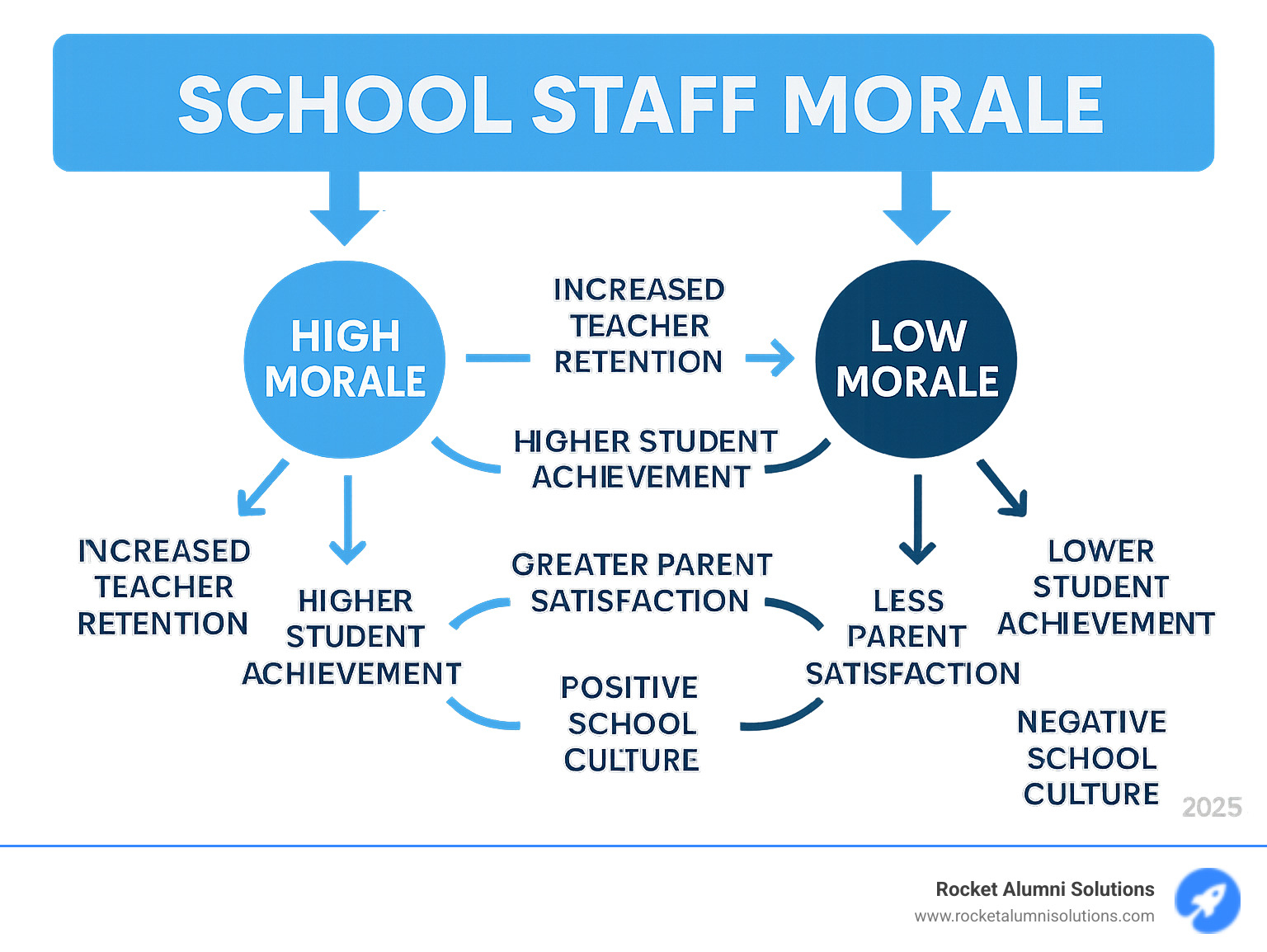Why School Staff Morale is the Foundation of Educational Excellence
School staff morale directly impacts every aspect of your educational environment, from teaching quality to student outcomes. When teachers feel valued and supported, they create more engaging learning experiences, build stronger relationships with students and parents, and stay in the profession longer.
Key factors that boost school staff morale:
- Administrative support - Backing teachers in discipline decisions and parent conflicts
- Reasonable workloads - 89% of teachers say capping class sizes would improve morale
- Recognition and appreciation - Both formal accolades and informal praise
- Professional autonomy - Trust in teachers' expertise and judgment
- Work-life balance - Flexible schedules and mental wellness support
Research shows that teachers with high morale go beyond basic instruction - they invest extra time in creating meaningful learning experiences, stay updated with educational trends, and actively engage with parents. Conversely, low morale leads to higher turnover, with high-poverty schools losing about one-fifth of their teaching staff yearly.
The ripple effects are clear: positive teaching experiences directly correlate with improved student academic outcomes, while low school staff morale creates negative classroom environments that hinder learning.
I'm Chase McKee, Founder & CEO of Rocket Alumni Solutions, and through building our interactive recognition platform to $3M+ ARR, I've seen how proper appreciation and community building transforms school staff morale. Our work with schools nationwide has shown that when educators feel genuinely valued and recognized, it creates a positive cycle that benefits the entire school community.

Diagnosing the Morale Meter: Key Factors and Warning Signs
What exactly is staff morale? At its simplest, it's the overall outlook, attitude, satisfaction, and confidence that employees feel at work. In the education sector, it's the heartbeat of a school, gauging how educators perceive their jobs, their work environment, and the organization as a whole. When that heartbeat is strong, the entire school system thrives.
We've found that teacher morale isn't just a nice-to-have; it's a critical component of a strong school culture and directly impacts teaching quality. Teachers with high morale are more likely to create engaging lessons, adapt to new educational trends, and go the extra mile to ensure student understanding. They invest time and energy into creating learning experiences that not only impart knowledge but also inspire a love for learning. This translates into teachers who actively seek to stay updated with the latest educational trends and adapt their teaching styles to meet current student needs.
The relationship between teacher morale and student learning outcomes is profound. Happy teachers establish a positive learning environment that spurs student participation, amplifies motivation, and nurtures superior learning outcomes. A positive classroom atmosphere, fostered by a high-morale teacher, leads to deeper comprehension and better academic performance. Conversely, low morale can lead to teachers doing the bare minimum, focusing on delivering lessons without ensuring student understanding, negatively impacting instruction quality.
Beyond academics, school staff morale significantly affects relationships with students and parents. Teachers with high morale are more successful in developing stronger connections, engaging in meaningful discussions, addressing issues swiftly, and actively involving parents in the educational journey. They are able to build valuable interpersonal relationships that positively impact a student's overall academic experience.
So, what are the key factors that influence this vital morale? We can categorize them into intrinsic and extrinsic elements. Intrinsic factors include job security, teacher autonomy, and the overall school climate. These are often more directly addressable by building-level leaders. Extrinsic factors, on the other hand, encompass compensation, district support, and the feeling of being undervalued. While compensation is a significant factor – teachers earning a median wage of $65,000 requested a 31 percent pay raise, leading to an annual salary of $85,000 – it's crucial to remember that it's not the only factor. In fact, only 10% of teachers stated that a pay raise was the only thing that would improve their morale.
External pressures also play a role. Media narratives and political divisiveness can significantly impact how teachers feel about their profession. The COVID-19 pandemic, for example, initially boosted public appreciation for teachers, but this positive sentiment has since waned, returning to pre-pandemic challenges.
How to Spot the Signs of Low School Staff Morale
Identifying signs of low school staff morale is crucial for proactive intervention. Experienced school leaders often sense the "undercurrent" of morale, but there are tangible indicators to look for:
- Absenteeism and Lateness: Faculty and staff who are consistently late, absent, or leave before students do can be a clear sign of disengagement and low morale.
- High Turnover: This is perhaps the most devastating sign. When positive, effective staff members leave, it can create a vacuum and leave behind those with negative attitudes. High turnover not only disrupts continuity but also signals deep dissatisfaction within the school.
- Negativity and Constant Complaints: Teachers described as "curmudgeons" or "energy vampires" who have a problem for every solution are clear indicators. While legitimate concerns should be heard, persistent negativity without constructive solutions can be a symptom of low morale.
- Lack of Engagement: Apathy towards school initiatives, professional development, or even student activities can signal that staff members are doing the bare minimum.
- Uncooperative Behavior: Reluctance to collaborate, participate in school functions, or support colleagues can stem from a feeling of being undervalued or burned out.
- A "Gotcha" Mentality: When staff feel constantly monitored or criticized rather than supported, it breeds cynicism and resentment.
We must remember that low morale is correlated with faculty and staff turnover and general unhappiness, ultimately leading to negative student outcomes.
The Top Morale-Boosters Teachers Actually Want
While pay is a significant factor, teachers have identified several other key areas that would dramatically improve their morale. We've seen this reflected in recent surveys:
- More Staff: Hiring additional teachers, paraprofessionals, substitute teachers, and mental health counselors is a top priority. 89% of teachers say that capping class sizes would improve their morale. For example, a tech teacher supervising 25 students in a woodshop setting due to class size issues highlighted the need for more support.
- Stricter Student Discipline and Cellphone Rules: This is a major one. 82% of high school teachers and 73% of their middle school counterparts say that stricter rules around student cellphone use would improve their morale. Many teachers feel that the emphasis on "restorative justice" sometimes reduces consequences for serious student behavior, negatively impacting their ability to manage classrooms effectively.
- Leadership Changes/Support: Teachers with 15 or more years on the job say leadership changes would increase their morale, compared to 8% of those with fewer than three years’ experience. Teachers want leaders to effectively manage student discipline, advocate for their needs, communicate clearly, and show appreciation. They want to be trusted and treated as professionals.
- Mental Wellness Days: 56% of teachers believe their morale would improve if they were permitted or encouraged to take mental wellness days. Given that 1 in 20 teachers will struggle with a diagnosable mental health issue that will last more than a year, this is a critical need.
- Better, More Affordable Healthcare Benefits: 53% of teachers believe their morale would rise if they had better, more affordable health care. Many teachers struggle to obtain affordable options for their families.
These factors highlight that improving school staff morale requires a holistic approach that goes beyond just salary, focusing on working conditions, administrative support, and overall well-being.
Building a Foundation of Support: Systemic Strategies for Lasting Change
Creating a thriving school environment where school staff morale flourishes isn't about quick band-aid solutions. It's about building something deeper—a foundation of trust, respect, and genuine partnership with your educators.
Think of it this way: when teachers feel truly supported, empowered, and valued as professionals, they don't just show up to work. They bring their best selves to every classroom interaction, every parent conference, and every challenging moment with students.

The magic happens when we stop treating teachers as employees who need constant oversight and start treating them as the skilled professionals they are. This shift in mindset creates a positive school culture where shared decision-making becomes the norm, not the exception.
Foster a Culture of Recognition and Appreciation
Here's something we've learned from working with schools nationwide: recognition isn't just a nice gesture—it's fuel for the soul of education. When teachers feel genuinely seen and appreciated, their energy transforms the entire building.
Peer-to-peer recognition creates some of the most powerful moments. Programs where colleagues nominate each other for going above and beyond build incredible community bonds. It's teachers celebrating teachers, which carries a special weight that administrative praise sometimes can't match.
Formal accolades matter too, but they work best when they feel personal and specific. Celebrating work anniversaries, significant achievements, or innovative teaching moments through ceremonies or awards shows that excellence doesn't go unnoticed.
The real magic often happens in the informal moments—a handwritten note left on a desk, a genuine compliment in the hallway, or a positive shout-out during a staff meeting. Research shows that 43% of highly engaged employees receive feedback at least once per week, highlighting how consistent appreciation builds momentum.
Celebrating personal milestones like birthdays or family achievements reminds teachers that they're valued as whole people, not just instructional machines. And here's a heartwarming idea: having students write appreciation notes to their teachers creates a circle of gratitude that reinforces why we're all here in the first place.
The key is consistency. As research on positive teaching experiences and student outcomes shows, when teachers feel appreciated, it directly impacts how they connect with students, creating better learning outcomes for everyone.
Empower Teachers with Autonomy and a Voice
Nothing kills school staff morale faster than micromanagement. Teachers are trained professionals who entered education because they're passionate about learning and growth. When we trust their expertise, remarkable things happen.
Avoiding micromanagement starts with assuming positive intent. When teachers feel trusted to design their lessons, assess their students, and manage their classrooms based on their training and experience, they rise to meet that trust.
Meaningful teacher input in school decisions transforms the workplace dynamic. Whether it's curriculum development, scheduling, or school policies, involving teachers in decisions that affect their daily work builds genuine buy-in and ownership.
Curriculum freedom within reasonable guidelines sparks creativity and innovation. Teachers know their students best—they should have the flexibility to adapt their teaching methods to meet those unique needs.
Choice in professional development respects teachers' time and individual growth goals. Instead of mandatory, one-size-fits-all training sessions, offer options where teachers can pursue learning that genuinely interests and benefits them.
When we communicate transparently and empower teachers to make professional decisions, we create an environment where respect flows naturally and morale thrives as a positive outcome.
Prioritize Professional Growth and Wellbeing
Investing in your staff's growth and wellbeing isn't just the right thing to do—it's essential for sustainable school staff morale. Teaching is demanding work, and educators need support to thrive long-term.
Meaningful professional development connects directly to teachers' daily challenges and goals. This might include relevant workshops, peer mentoring programs, or opportunities for teachers to share their expertise with colleagues. When experienced teachers lead sessions for their peers, it builds collaborative professional communities.
Mental health support has become crucial, especially knowing that 1 in 20 teachers will struggle with a diagnosable mental health issue lasting more than a year. Employee assistance programs, counseling services, and stress management resources provide vital safety nets.
Work-life balance initiatives show teachers that their wellbeing matters. Flexible scheduling for parent conferences or grading time can significantly boost loyalty—research indicates that 80% of workers say flexible options make them more loyal to their employer.
As supporting teacher wellbeing in education research demonstrates, true wellbeing encompasses multiple dimensions: occupational, physical, social, spiritual, environmental, financial, intellectual, and emotional health. When schools support teachers across these areas, they build resilient, dedicated teams.
The beautiful truth is that when we genuinely invest in our educators' growth and wellbeing, we're not just improving morale—we're creating the conditions where both teachers and students can flourish together.
Practical and Creative Boosters: A Year-Round Plan for Improving School Staff Morale
Boosting school staff morale doesn't always require a huge budget. Often, it's the consistent, thoughtful gestures that make the biggest difference. We've found that planning a year-round calendar of staff morale activities, much like planning a curriculum, can be a game-changer. It takes the "heavy mental burden" off administrators and sunshine committees, ensuring that appreciation is baked into the school year.

Low-Cost, High-Impact Morale Boosters
The most effective morale boosters often cost very little but show immense respect for your staff. Duty-free lunch is a perfect example - giving teachers a guaranteed break from supervision duties, even occasionally, demonstrates that you value their need for respite and personal time.
"Cheer" carts with snacks and drinks that visit classrooms can brighten anyone's day. A rolling cart filled with coffee, tea, water, and snacks creates delightful surprises, especially during those overwhelming weeks when everyone feels stretched thin.
Never underestimate the power of handwritten notes. A personalized, handwritten thank-you note from a principal or colleague shows genuine thought and appreciation in our digital world. It's something teachers can keep and treasure long after the busy day ends.
Reducing unnecessary meetings might be the most appreciated gesture of all. Teachers' time is precious, and if a meeting's purpose can be achieved through an email or brief memo, skip the meeting! When meetings are necessary, make them efficient and impactful.
Creating staff shout-out boards - whether physical or digital - gives everyone a space to publicly acknowledge colleagues for both big and small acts of kindness or effort. These become wonderful reminders of the positive community you're building together.
Potlucks and social gatherings work magic for team building. Organizing casual potlucks, virtual coffee hours, or happy hours creates those informal moments where real connections happen. Food has this amazing way of bringing people together and fostering genuine camaraderie.
Spirit days add a touch of fun and lightheartedness to break up routine. Encouraging themed dress-up days or fun events for staff reminds everyone that work can include joy and laughter.
One creative idea we love is "letters to self" - encouraging teachers to write letters to themselves at the beginning of the year, to be delivered during pressure points like late winter or early spring. This serves as both self-reflection and a personal coping mechanism during challenging times.
Planning a Year of Staff Morale Activities
To ensure consistent appreciation and avoid burnout for those organizing events, we recommend creating a year-long framework. This approach allows for proper budgeting, preparation, and a balanced mix of activities throughout the school year.
September is perfect for a Back-to-School Yard Sale where staff can find gently used classroom supplies and personal items. This practical event helps teachers stock their classrooms while building community connections right from the start.
October brings natural opportunities for fun with a Pumpkin Decorating Contest. This seasonal activity encourages creativity and friendly competition while celebrating the fall season together.
November calls for gratitude activities. A Gratitude Jar where staff members can drop notes of appreciation for colleagues creates a wonderful collection of positive messages to share during Thanksgiving week.
December warmth comes through simple comforts like a Hot Cocoa Bar set up in the staff lounge. During the hectic holiday season, this small gesture provides both physical warmth and emotional comfort.
January can feel overwhelming after winter break, making it perfect for a Snowflake Hunt - hiding positive messages or small treats around the school for staff to find. This treasure hunt approach adds playfulness to the post-holiday return.
The key is consistency and variety. Some months might feature team-building activities that bring staff together for collaborative fun, while others focus on individual recognition or practical support. Ideas for fun team-building events can provide additional inspiration for keeping your calendar fresh and engaging.
The goal isn't perfection - it's showing up consistently for your staff throughout the year. When teachers know that appreciation and support are woven into the fabric of their workplace, school staff morale naturally flourishes, creating the positive environment where both educators and students thrive.
Frequently Asked Questions about Improving School Staff Morale
Improving school staff morale can feel overwhelming, especially when you're juggling a million other responsibilities. But here's the good news: small, thoughtful changes often make the biggest difference. Let's tackle some of the questions we hear most often from school leaders who want to create a better environment for their teachers.
What is the single most important factor for improving teacher morale?
You might think it's all about the paycheck, and while compensation matters, the research tells a different story. Consistent and visible administrative support is actually the game-changer for lasting morale improvement.
What does this look like in practice? It means trusting your teachers as the professionals they are. When a parent calls to complain about a classroom decision, you listen to both sides before jumping to conclusions. You advocate for your teachers' needs at district meetings. You communicate clearly about changes and expectations instead of leaving people guessing.
Most importantly, you become a leader who encourages and supports rather than someone who just manages from a distance. Teachers notice when you have their back, and that trust becomes the foundation for everything else.
How can we boost morale without a big budget?
Here's where creativity beats cash every time. The most powerful morale boosters often cost nothing but show tremendous respect for teachers' time and expertise.
Genuine, specific praise works wonders. Instead of a generic "good job," try "I noticed how you handled that difficult parent conference with such patience and professionalism." That personal touch makes all the difference.
Protecting planning periods is huge. When you shield teachers from unnecessary interruptions during their prep time, you're saying their professional work matters. The same goes for reducing unnecessary meetings – if it can be an email, make it an email.
But here's the secret sauce: actively listen and implement teacher feedback. Send out surveys, form advisory committees, and then actually act on what you hear. When teachers see their suggestions lead to real changes, it builds trust and shows their voices matter.
Providing flexibility where possible – like flexible schedules for grading or parent conferences – can dramatically improve work-life balance. Research shows that 80% of workers become more loyal when they have flexible options.
How does student discipline affect teacher morale?
This is a big one, and it's often the elephant in the room. Student discipline problems can absolutely crush school staff morale if teachers feel like they're fighting these battles alone.
When classroom management becomes a constant struggle without administrative support, teachers burn out fast. They feel helpless when consequences aren't consistently applied or when they're expected to handle serious behavioral issues without backup.
This is exactly why teachers are asking for stricter rules around student cellphone use – 82% of high school teachers and 73% of middle school teachers say this would improve their morale. They're also advocating for more consistent support with disciplinary actions.
The solution isn't complicated, but it requires commitment. Clear policies, consistent enforcement, and strong administrative backup are essential. When teachers know you'll support them in maintaining an orderly learning environment, their confidence soars. They can focus on teaching instead of constantly managing disruptions.
When teachers feel supported in discipline matters, everyone wins – including the students who benefit from a more focused learning environment.
Conclusion: Creating a Culture Where Educators Thrive
When we invest in school staff morale, we're not just being nice to our teachers—we're making one of the smartest decisions we can make for our entire school community. Every effort we put into supporting our educators comes back to us multiplied through better teaching, happier students, and stronger school culture.
Think about it: when teachers feel valued and supported, they bring their best selves to the classroom every single day. They stay late to help struggling students, they innovate with new teaching methods, and they build the kind of relationships that make learning magical. This isn't just feel-good theory—it's what happens when we prioritize professional respect and consistent support for our staff.
The strategies we've explored throughout this guide all work together to create something bigger than their individual parts. When we combine daily recognition with professional autonomy, when we pair mental health support with meaningful professional development, we build a foundation where educators don't just survive—they absolutely thrive.
At Rocket Alumni Solutions, we've witnessed how powerful recognition can be in changing school environments. When schools celebrate their staff achievements through our digital recognition platforms, something beautiful happens. Teachers feel seen, appreciated, and connected to their school community in ways that ripple out to benefit everyone.
The investment you make in school staff morale today shapes your school's future. Every handwritten note, every protected planning period, every time you trust a teacher's professional judgment—these moments add up to create the kind of workplace where exceptional educators want to stay and grow.
Your teachers pour their hearts into educating the next generation. They deserve to work in an environment that pours back into them. When we commit to fostering environments where every staff member feels appreciated, respected, and motivated, we create the conditions for true educational excellence.
Because here's the beautiful truth: when our educators shine, our students shine even brighter. And that's what makes every effort to boost school staff morale worth it.
Lift your school's recognition program with digital solutions


















































































































































































































































































































